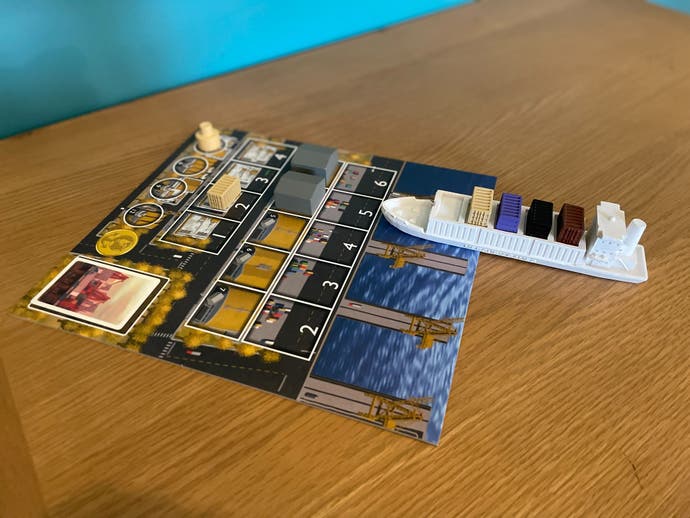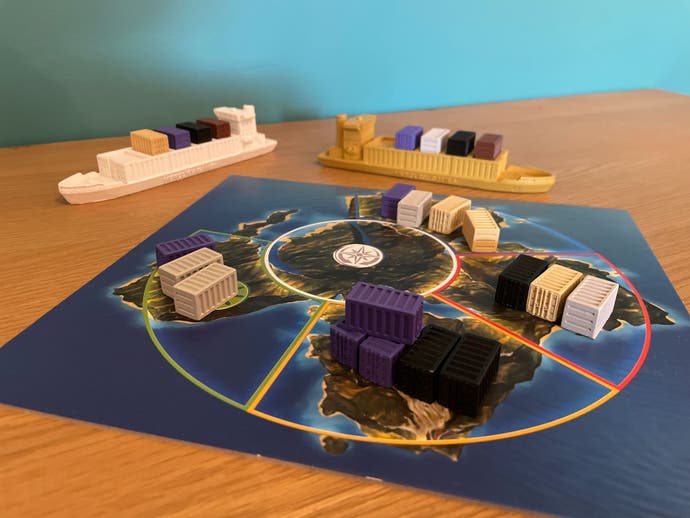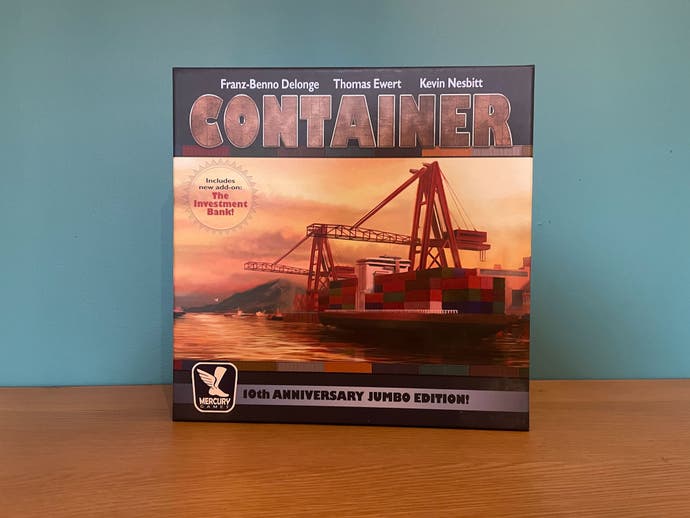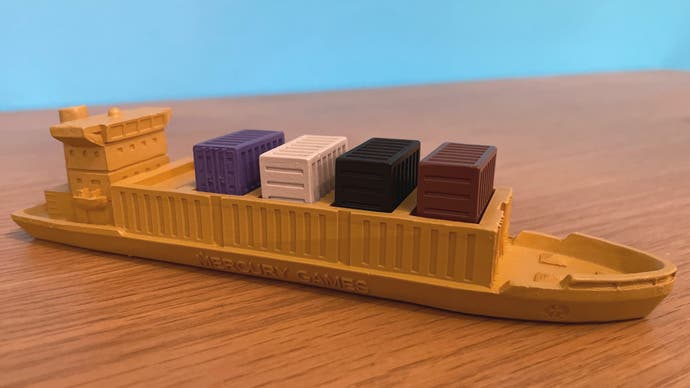Container, a board game with the most boring theme imaginable, is one of the most exciting experiences I've ever had
Boxship of surprises.
You'd be forgiven for thinking that Container is less an actual playable board game and more a parody of the mundane, dryly economical themes adopted by the tabletop hobby's more esoteric offerings.
After all, it's a board game called Container, about shipping containers, with a drab image of a container-stacked boat on its cover. Those tightly-packed boxes leave little room for imagination. Its Jumbo Edition, released in 2018 for its tenth anniversary, breathlessly announces the “exciting” addition of an investment bank. You couldn't write a finer satire.
But this is no Cones of Dunshire. Yes, Container is literally a board game about shipping containers. It's also one of the most singular, thrilling gaming experiences I've ever had.
At the heart of Container's masterful gameplay design is its player-driven closed economy. Unlike the effectively limitless supply of money in games such as Monopoly, which periodically inject money from a mysterious external supply, the cash in the hands of players and a central bank at the start of Container is all the money there will be.
Getting more cash isn't as simple as passing Go, either. While producing containers via your factories gradually circulates money to your neighbouring players (by paying one-dollar dues to ‘Union Bosses'), and there's the option to take out loans from the bank in a pinch - albeit with the risk of debt-inducing repayment attached - the remaining cashflow comes down to the players themselves.
Points are scored by buying containers offered at auction. Winning an auction adds the offered shipload of containers to your final scoring tally, which racks up points per colour based on each player's secret objective card.
To get containers to auction, though, you'll first need to make them. It's not as simple as just producing containers in the colour you need, as only other players can buy the containers from your factories, transporting them by road to their board before offering them for public sale via their harbour. There's no way to just instantly trade your own containers for points, like the magical market of most conventional board games; if you want to score for your own containers, you'll need to sell them to a rival before sailing over and buying them back. As is the way with shipping, it takes a long journey to reap the rewards.



Convincing others to buy your containers means making the colours that they want to buy, but also setting your prices fairly. Everything is left in the hands of the players to decide - you could try to undercut your rivals and make up for a low price with high sales, or charge eye-watering prices for a colour that only you have to offer. The entire game is driven by this direct interaction between players, taking the trading and haggling of board games like Catan and Monopoly to its most extreme form.
There's a sandbox-like feel to the no-rails freedom granted, for better and worse. Selling containers to other players is essential to both making money and scoring points, but pricing your goods too high or oversaturating a single colour means that supply will outstrip demand - with the potential to end up bankrupt or crash the game's entire in-game economy. (The Jumbo Edition's Investment Bank expansion adds an AI-controlled set of brokers who make the risk of financial crisis a little less harsh.) New players or those who play too recklessly may end up in frustrating, no-win situations - despite the knowledge that they had the power to avoid them with careful planning and savvy business decisions.
Yet this potentially unforgiving, inherently flawed structure is exactly what makes Container so unique and essential. Few modern games are brave enough to leave complete control in the hands of the players, removing the safety nets and guardrails offered by rules designed to always keep things moving forwards and players in the running. Container isn't a complicated game to play, which makes its accurate simulation of a complex working - or broken - economy within the microcosm of a 90-minute board game an even more impressive feat. If things judder to a halt, it's on the players - not the game.
It's a shame that this genuinely one-of-a-kind gameplay experience is wrapped in such a dull wrapper. Container's muddy and messy artwork is ugly, failing to dispel the immediate idea that the board game is anything beyond its drab appearance. It means that too many players are likely to overlook it as yet another amateur production of a generic economic strategy game.

As a silver lining, the Jumbo Edition's physical pieces are staggering, casting players' boats and containers in dense resin - making the standard-size box a seriously hefty package in both weight and price. There's a deep joy to literally stacking colourful containers on the flat deck of a boxship as it sails between players' boards and the central island, embracing the tangible pleasure that only tabletop games can offer.
The cherry on top of this in-person excellence is that this board game dressed in the least exciting themes imaginable also has one of the most wonderfully inventive gimmicks of any tabletop experience. Container turns the entire table into the sea, counting anything that isn't a board - such as players' harbours and the island - as open water. While there's no tracking of nautical miles in inches or anything so convoluted - you're either docked or sailing - it's a brilliantly simple trick that expands the game beyond the confines of its cardboard pieces.
By its nature, Container won't be for everyone. Despite its gameplay genius, don't expect to find this replacing Catan or Ticket to Ride in your local board game cafe anytime soon. But for those willing to look past its unappealing appearance, you'll be rewarded with a game that is truly unlike anything else you've played before. Its simple rules and mundane theme are the foundation for a richly social experience that showcases why we play board games together in person.

